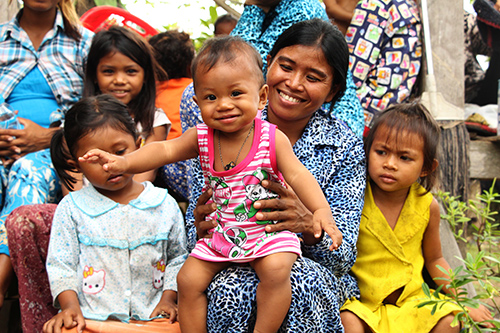News
Initiative brings sexual health information to remote parts of Cambodia
- 20 January 2017
News
PREAH VIHEAR, Cambodia – “I still remember when my neighbour experienced complications during delivery. She passed away on the way to the referral hospital. It was terrifying,” 16-year-old Kem Lean told UNFPA in the northern Cambodian province of Preah Vihear. “Now that I’m pregnant myself, I keep thinking that I don’t want that to happen to me.”
Still, Kem Lean had not yet sought antenatal care for her pregnancy – she did not know it was important. She was also unaware that pregnancy so early in life could pose risks to her health and to the long-term welfare of her child.
She is not alone. Lack of knowledge about sexual and reproductive health is common in remote communities like Svay Village, where Kem Lean lives. This leads to poorer maternal health, less use of family planning and higher rates of adolescent pregnancy.
According the a 2014 demographic and health survey, rural women are less likely than urban women to receive information about family planning from the media, and teens in rural areas are more likely to become pregnant. Over a quarter of girls aged 15-19 years old in Preah Vihear Province “have begun childbearing,” according to the survey.

A new initiative, implemented by UNFPA and UNICEF, aims to improve access to sexual and reproductive health information in the most marginalized and isolated communities. The programme trains district leaders to conduct outreach on these sensitive topics.
“It’s my first time being pregnant, and I am a bit anxious. I want to be well-prepared for the delivery,” said Kem Lean, who did not continue her education past grade 8.
“A few days ago, I heard from the villagers that there was be an outreach session related to maternal health topics in my neighbourhood, so I decided to join. I was eager to know more.”
Rolled out in the second half of 2016, the initiative helps district leaders plan and implement social development projects, which are often neglected in municipal budgets.
In Svay Village, a team of village, commune and district representatives – from the health, education and women’s affairs sectors – went door to door to encourage participation in the upcoming UNFPA-supported information session.
They also invited health professionals to speak at the session about issues such as maintaining a healthy pregnancy, the benefits of family planning and the risks associated with early pregnancy.
About 50 villagers in Svay attended the session, which was organized by the Sangkum Thmey district municipality.

“Now I know what kinds of food I should eat and should not eat,” said Kem Lean. “The trainer also told me to visit a health centre for antenatal care at least four times during my pregnancy. I didn’t know this before.”
She also made plans to give birth in a health facility.
“When my due date is nearing, I will move into my relatives’ house in Siem Reap Town because the quality and facility there are much better than that in my community,” she said. “It’s safer for me and the baby.”
Louern, a mother of two, said the family planning information at the session was particularly useful.
“My husband and I used to talk about this. We think two children are enough, but we’re not sure which way is the most suitable and appropriate for us. But now I’ve become more aware of modern contraceptives, their benefits and side effects. When I go back home, I’m going to discuss with him about these possible choices,” she said.
“Promoting sexual and reproductive health information is not just a health imperative. It’s also critical to poverty reduction,” explained Ros Heng, leader of Sangkum Thmey District. “When people are better informed, they will know how to delay their childbirth or stop childbearing. Being able to have the number of children they desire empowers people to improve their and their next generation’s livelihoods.”
Kem Lean echoed these thoughts when she was asked about her future plans.
“I believe that if I space my childbirths properly, my children’s future will be much brighter than mine,” she said. “I will make sure they finish school and get a good job.”